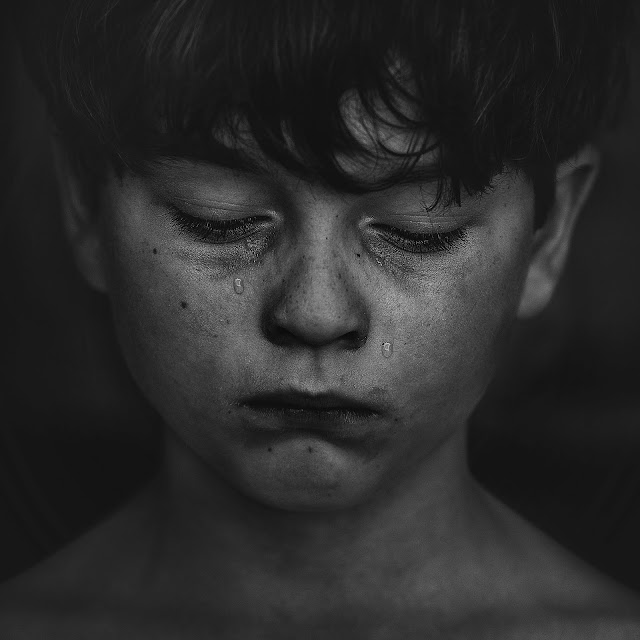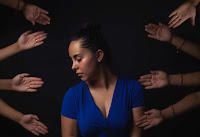 |
PTSD
Overview of Post-Traumatic Stress Disorder
Two weeks back I was waiting for a train in a quite busy platform. I saw a lady was running to catch her train which was about to leave in a moment on the other platform. She was accompanying two of her children, a boy and girl. To catch the train she need to take the over-bridge so she was rushing. The children also were trying hard to match their mother's foot step. Suddenly the girl, age about 6 years, stopped while stepping up the over-bridge. She became so annoyed and started crying. The mother scolded her and took her hanging to cross the bridge.
I and other few waiting passengers became very surprised. After sometime a passerby , known to the family told us that the girls father had an accident a month ago in a fall and fighting for his life with a spine injury. The mother took a job to run the family in other town, she comes home weekly and go to workplace along with the children every Monday. After her father's accident she became very scare and trouble-maker.
We were shocked, hearing the version but became very certain that it would not end soon for the mother-daughter duo but last long until the girl was not treated properly.
Post-Traumatic Stress Disorder (PTSD) is characterized by severe anxiety, stress, flashbacks, uncontrollable undesired thoughts, nightmares and so likes. It is expressed by a set of reactions that can develop in people who have been through a traumatic event which threaten their life or safety. or that of others around them. These could be various events like accidents, natural calamities or sexual assault, death or fear of death of beloved one. As a result, the person experiences feeling of intense fear, helplessness or horror.
Signs and Symptoms of PTSD
Most of the cases the signs and symptoms develop within 3 months of the traumatic incident but it may vary. It is also seen that the symptoms are largely different person to person on course of expression of their feeling. Also it is seen that traumatized person develops ongoing (chronic) or short-term (acute) disorders. When these disorders last more than 1 month then the person need observation. Sometimes it is also seen these disorders disappear within 6 months and some last for longer time and the symptoms are considered chronic.
A person with PTSD experiences mainly four types of difficulties such as
Re-living or Re-experiencing symptoms
- Flashbacks - re-experiencing trauma repeatedly with racing heart and sweating
- Harrowing dreams
- Frightening Thoughts
Avoidance Symptoms
- Deliberate attempts to places, objects, events of traumatized experience
- Avoiding thoughts, story or feelings related to the event
Excessive Alertness or Arousal Symptoms
- Being easily scared
- Feeling tense, nervous, irritable
- Sleeping difficulty
- Lack of concentration
- Sudden outburst
Emotional and Cognition Symptoms
- Feeling emotionally flat and numb
- Negative thoughts
- Distorted feeling like guilt and blame
- Feeling cut-off or detached
- Loss of interest
It is however common, natural and usual to experiences of some of the above symptoms after a dangerous or painful event. For some people it goes away after few weeks and they lead normal life. This disorders are called Acute Stress Disorder (ASD). When these symptoms last long then the experiencing person are suspected of developing PTSD. And they need professional help or else it may further deteriorate the condition. If persisted for long, person with PTSD may develop additional symptoms like Stress, Depression and Anxiety, Neophilia ,dependence and addiction to alcohol and drugs or Sleep Paralysis
PTSD with Children and Teens
Children and teens are very vulnerable for developing PTSD and they may have extreme reactions to trauma, but it is also seen that they try to suppress the reactions on fear of their caring hands or their
 |
We
need to be very careful to the very young children if they show some
unusual and inconsistent pattern of behavior for a longer time.
Photo by Alicia Petresc on Unsplash |
parents and teachers. Very young children may show the following behavioral patterns :
- Forgetting and talking problems
- Wetting the bed
- Acting out scary event
- Being unusually clingy
We need to be very careful to the very young children if they show some unusual and inconsistent pattern of behavior for a longer time.
Concerns
It is well researched with facts and figures that anyone can develop PTSD at any age. War veterans, children and people who have been through a physical, mental and sexual assault, abuse, natural disaster, accidents and likes. It is also found that 7 -10 out of 100 people experience PTSD at some point of their lives. Women are prone to develop PTSD than men. Heredity also is a significant factor for developing these disorders.
The question now is - why every body do not develop PTSD when they experience same dangerous event ?!
It is very interesting thing to note that not everyone develops PTSD out of same event. In fact, most people does not develop symptoms or the disorder. There are two opposite factors which are mainly responsible in whether a person will develop PTSD. They are namely- Risk Factors - are the key factors of developing PTSD - the various factors we already have discussed above plus childhood trauma , lack of social connection and support, loss of job or home , having history of mental illness etc.
- Seeking out support
- Getting help and support after the event
- Mental acceptance of the event
- Positive thinking and learning from the loss
- Effective responsiveness and act against the event without fear.
If we go through the factors, it is clear that person's mental traits are very important for developing PTSD or fighting out PTSD.
Treatments
Effective treatments are available. These are Psychological (talk therapy) and Medication. Sometimes both are needed . Drugs or medicines are not prescribed normally within first 4 weeks of symptoms appearing. In this period psychological means are used to treat the patients. If severity of distress is high and cannot be controlled psychologically then medicines are used. It is observed that if it is detected earlier and the patient is taken to psychotherapist, most recover on their own, obviously here support and help from family and friends is very vital.
Self-Help
Take the Challenge
Recovering from PTSD is a gradual and ongoing process, It can not be expected that healing will happen overnight and the traumatized memory will disappear permanently. This stored memory can make life difficult at times. However , there are many things we can do to cope with residual symptoms and reduce our anxiety and fear.
 |
It is important to remember that we have strengths and coping skills that can get us through tough times
Photo by Alexander Mils on Unsplash |
Trauma makes us mentally powerless and vulnerable. Overcoming our sense of helplessness is key to overcoming PTSD. It is important to remember that we have strengths and coping skills that can get us through tough times.
One of the very proven ways to reclaim and reestablish our sense of power is by helping others, volunteer our-self by whatever way we can. Taking positive actions directly challenge the sense of helplessness which is the primary symptom of PTSD.
Get Going
When we are suffering from PTSD, exercise can do more than just release endorphins and improve mood and outlook. By focusing on our body we can feel our nervous system begin to move out of the immobilization stress response.
There are various types of exercise, we should choose one or two that we can continue daily basis without any break.
Breathing exercise or Aerobic exercise is very useful to cope with stress. We may think of getting expert help to select that suits us.
Just walk on the streets also give huge boosts into our mental strengths.
Spending time in nature helps veterans cope with PTSD symptoms and transition back into civilian life. We can get benefit from the relaxation , seclusion and peace that come with being out in nature.
Reaching out for support
PTSD makes us feel disconnected from others. We may be tempted to withdraw from social activities and our relatives , friends. But it is important to stay connected to life and the people who care us. We need not talk about our trauma if we don't want to, but companionship and caring support is vital for our recovery. We should try to find and reach out a person who will listen when we want to talk, without judging, criticizing or continually being distracted. That person may be our beloved one, a friend, a family member, a colleague or a professional therapist.
Modification of LifeStyle to support PTSD Treatment
- PTSD is the serious threat to our body and physical activities, therefore it is important for us to look our lifestyle. A disciplined way of leading our life will help immensely to overcome symptoms and trauma
- Taking time for Relaxation - it includes yoga , breathing exercise (pranayam), deep breathing etc
- Avoid Alcohol, Drugs, excessive smoking- It is proven that substance uses aggravate symptoms of any mental illness. So it is advisable not use substances.
- Healthy Diet - plays a vital role in our overall well being in any forms. Maintaining time, quantity and quality of food is very important. If needed we may get in touch with Dieticians for help.
- Getting Adequate Sleep - Sleep deprivation is one of main cause of mental illness. A 7-9 hours sleep per night is necessary for us to be physically and mentally fit. We must check and modify, if needed, the ambience of our bedroom to suit for good sleep. Throw away clutters, clean the room and ensure darkness while sleeping. We must develop a sleeping ritual as sleep is the subtle power house of our livelihood.
Final Thoughts
Early detection and treatment is vital for recovery from PTSD. Therefore whenever we suspect any post-traumatic stress disorder, we must get help right away. The sooner PTSD is treated, easier is to overcome. If we are reluctant to seek help, it is to be noted that PTSD is not the sign of weakness, and only way to overcome it is to confront what happened to us and learn to accept it as part of our past. PTSD may become life threatening if not treated. The process is much easier (unlike OCD or Schizophrenia) with the guidance and support from an experienced therapist or doctor.
Related Articles on Mental Health
 |
 |
 |
|
|
 |
| Understanding and Living With Schizophrenia |













No comments:
Post a Comment